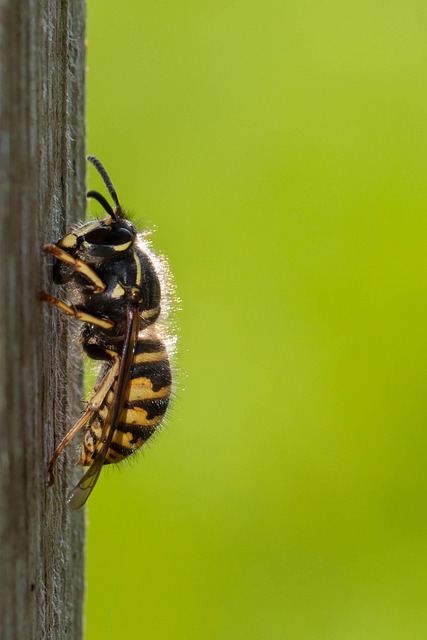Wasp infestations require professional residential wasp treatment for safe and effective management. Identifying specific species is key, as it dictates behavior and nesting habits. Chemical and non-chemical methods include targeted sprays, baits, eliminating nest sites, and using physical barriers. Regular inspections during warm months are crucial for prevention. Eco-friendly approaches involve using essential oils as natural repellents and integrating beneficial insects. For persistent or severe problems around homes, engaging expert wasp control services is vital, utilizing specialized knowledge and tools to swiftly eliminate nests and prevent future invasions.
Transform your outdoor spaces into peaceful oases with tailored deterrents! This comprehensive guide explores effective residential wasp treatment strategies, empowering you to create a harmonious environment. Learn the basics of understanding wasp behavior and identifying common nests in patios and gardens. Discover eco-friendly deterrent options that promote a balance between safety and nature. Additionally, we’ll delve into professional wasp control services, highlighting when and why expert intervention is crucial for comprehensive protection.
Understanding Residential Wasp Treatment: The Basics
Wasp infestations in residential areas can be a significant concern for homeowners, often requiring professional intervention for effective control and prevention. Understanding the basics of residential wasp treatment is essential for maintaining a safe outdoor environment. The first step involves identifying the specific wasp species present, as different wasps have unique behaviors and nesting habits. Common residential wasp treatments include both chemical and non-chemical methods.
Chemical interventions involve targeted sprays or baits designed to eliminate wasps while minimizing impact on beneficial insects and the environment. Non-chemical approaches focus on removing potential nest sites, sealing entry points, and using physical barriers. Professional exterminators often combine these techniques for optimal results, ensuring that wasp populations are effectively managed without posing risks to residents or local ecosystems.
Identifying Common Wasp Nests in Outdoor Spaces
Wasp nests can often be found in outdoor spaces, patios, and gardens, posing a potential hazard to residents and visitors alike. Identifying them early is crucial for effective residential wasp treatment. Look for telltale signs like papery, nest-like structures suspended from tree branches, eaves, or other elevated surfaces. These nests vary in size and can range from small clusters of cells to large, complex structures resembling balls or footballs. Wasps are highly territorial and protective of their nests, so any attempt to approach should be made with caution and ideally left to professionals for safe removal and treatment.
Regular inspections are key to maintaining a wasp-free environment. Homeowners should periodically scan their outdoor areas for any signs of nest activity, especially during the warmer months when wasps are most active. Early detection allows for prompt residential wasp treatment, preventing stings and ensuring peace of mind while enjoying your patio or garden.
Eco-Friendly Deterrent Options for Patios and Gardens
When it comes to keeping outdoor spaces pest-free, eco-friendly deterrents are a popular choice for those who want to maintain a harmonious relationship with nature. For patios and gardens, there are several residential wasp treatment options that are both effective and kind to the environment. One such method is using essential oils like citronella, peppermint, or lavender, which can naturally repel wasps and other insects. These natural repellents can be applied directly to plants or diffused in the air, creating a pleasant aroma while keeping wasps at bay.
Another sustainable approach is integrating beneficial insects into your garden ecosystem. Certain species of wasps, such as parasitoid wasps, prey on common garden pests like caterpillars and flies. By attracting these helpful wasps with specific plant varieties or insect hotels, you can encourage them to reside in your garden, naturally controlling wasp populations and promoting a balanced outdoor environment.
Professional Wasp Control Services: When and Why to Hire Experts
Wasp infestations in outdoor areas can be a serious concern for homeowners, often requiring professional intervention for effective and safe resolution. Hiring expert wasp control services is crucial when dealing with persistent or severe wasp problems, especially in residential settings. These professionals are equipped with the knowledge and tools to handle even the most challenging cases of wasp intrusion.
The decision to engage professional wasp treatment should be considered when DIY methods fail or when there’s a high risk of stings, such as near play areas or where individuals have allergies. Experts employ targeted residential wasp treatment strategies, ensuring minimal environmental impact while swiftly eliminating wasp nests and preventing future invasions. Their advanced techniques and specialized equipment make them indispensable in managing these delicate situations effectively and securely.
When it comes to outdoor spaces, patios, and gardens, tailored deterrents are key for a safe and enjoyable environment. By understanding basic residential wasp treatment methods, identifying common nest locations, exploring eco-friendly options, and knowing when to hire professionals, you can effectively manage wasp populations. Implementing these strategies ensures a peaceful outdoors experience without compromising your safety or the environment. Remember, proper care and knowledge make for a harmonious coexistence with these fascinating creatures.
